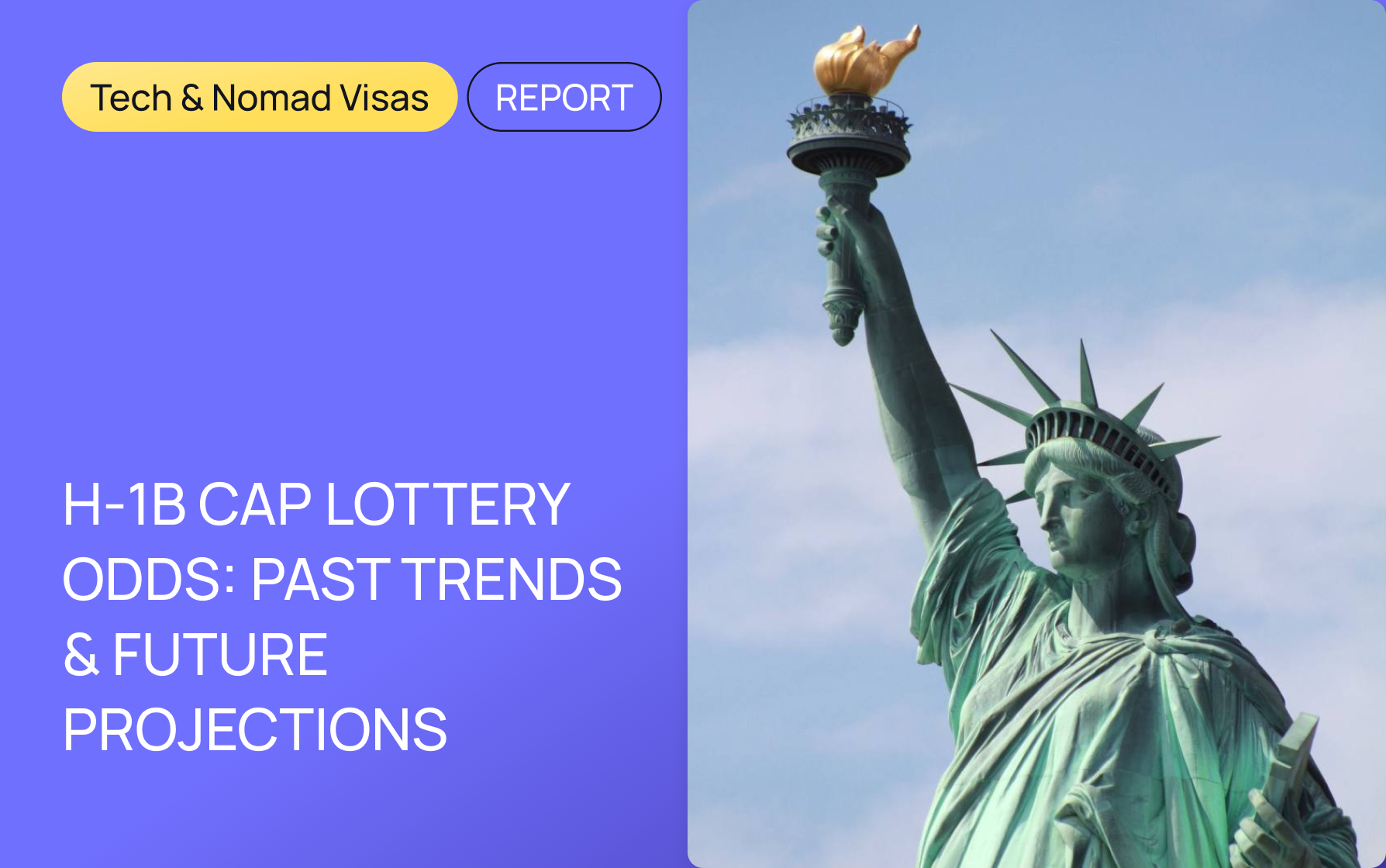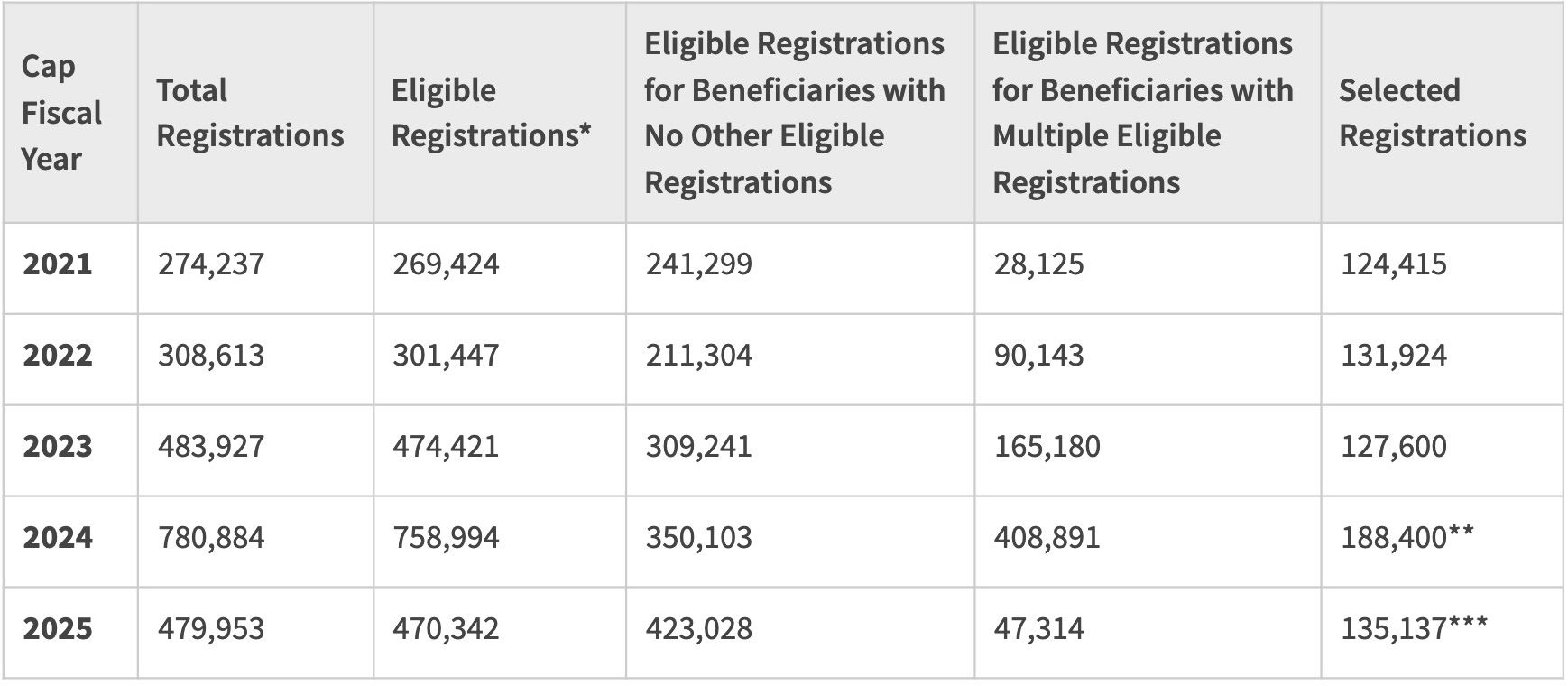
Seek more insights? Subscribe to our Monthly Newsletter
The H-1B visa lottery is a highly competitive process that shapes the U.S. job market for foreign skilled workers. With demand consistently surpassing the available visa caps, understanding the odds of selection has become increasingly important for both applicants and employers. This report delves into historical trends, factors influencing the odds, and future projections based on recent developments.
When the H-1B visa program began, the number of applications was relatively manageable. However, as the U.S. economy expanded and demand for skilled labor surged, the number of applicants quickly outstripped the available visa slots. To manage this growing demand, the U.S. government implemented the H-1B lottery system, which aimed to fairly allocate the visas among a highly competitive pool.
Introduction of the Electronic Registration System (FY2020)
In Fiscal Year 2020, the U.S. Citizenship and Immigration Services (USCIS) introduced the electronic registration system. This streamlined process allowed employers to pre-register applicants with a nominal fee, simplifying the application procedure. However, this also led to a surge in the number of registrations, making the lottery even more competitive.
The introduction of the electronic registration system led to a dramatic rise in the number of applicants. For example, in FY2023, there were 483,927 registrations for just 85,000 available visas, significantly lowering the odds of selection.
The odds of being selected in the H-1B lottery fluctuate each year depending on the total number of registrations. The table below illustrates the changing selection rates in recent years:
H-1B Lottery Selection Rates (FY2021–2025)

Several factors influence the odds of selection in the H-1B lottery. These include:
The annual cap remains fixed at 65,000 visas for the regular category and 20,000 for those with advanced degrees from U.S. institutions. This static cap, paired with increasing demand, contributes to the highly competitive nature of the lottery.
The number of registrations has been steadily increasing in recent years. For instance, FY2024 saw a near doubling of registrations from the previous year (780,884 registrations compared to 483,927 in FY2023).
Employers can submit multiple registrations for the same candidate, which can skew the odds in favour of certain applicants.
There are concerns regarding fraudulent registrations, where employers submit placeholder applications without genuine intent to hire. These increase the pool size, making the odds less favourable for genuine applicants.
Applicants with advanced degrees from U.S. institutions have a slightly better chance of selection, as they benefit from the additional 20,000 visas set aside for this category.
Economic factors influence employer behaviour. In times of high demand for skilled labour, more employers are likely to submit H-1B applications, further reducing the chances of selection.
Changes in immigration policies or procedural reforms can also affect the odds. Recent adjustments, such as the beneficiary-centric selection process, have aimed at ensuring fairness in the registration process.
A significant development in FY2025 was the implementation of a beneficiary-centric selection process, aimed at reducing the impact of multiple registrations for the same individual. This change has likely contributed to a decrease in the number of registrations but improved the selection process's integrity.
Despite this reduction, demand for H-1B visas continues to outstrip the cap, and it is expected that future lotteries will remain highly competitive. Applicants can expect similar odds of selection in the upcoming fiscal years unless there are significant policy changes, such as increasing the annual cap or prioritising certain industries.
Although the H-1B lottery is a random process, there are several ways to increase your chances:
By obtaining an advanced degree from a U.S. institution, you can enter two lotteries — one under the regular cap and another for the advanced degree exemption, doubling your chances of selection.
Providing complete and accurate information during the registration process is essential. Inaccuracies or missing data can lead to disqualification.
Employing an experienced immigration attorney and working with a reputable employer can increase your chances of a successful application.
Stay updated on changes to immigration laws and regulations, which can impact the lottery process.
Some employers, like universities and non-profit research organizations, are exempt from the H-1B cap. These employers can sponsor you for an H-1B visa without going through the lottery.
The H-1B lottery remains one of the most important mechanisms for bringing skilled talent to the United States. While the odds of selection can seem daunting, staying informed about the process and using strategies to improve your chances can help applicants navigate the complexities of the system. With ongoing changes in both policy and demand, the future of the H-1B lottery remains uncertain, but one thing is clear — the need for skilled workers in the U.S. is unlikely to diminish.
To get more information about this and related topics, read our previous reports:
Changing International Talent Trends From 2015 To 2025
Building A Strong Portfolio With Remote Work Achievements, Step By Step
To explore your USA relocation options, you may:
Subscribe to our social media platforms to stay up-to-date on global mobility news and opportunities: